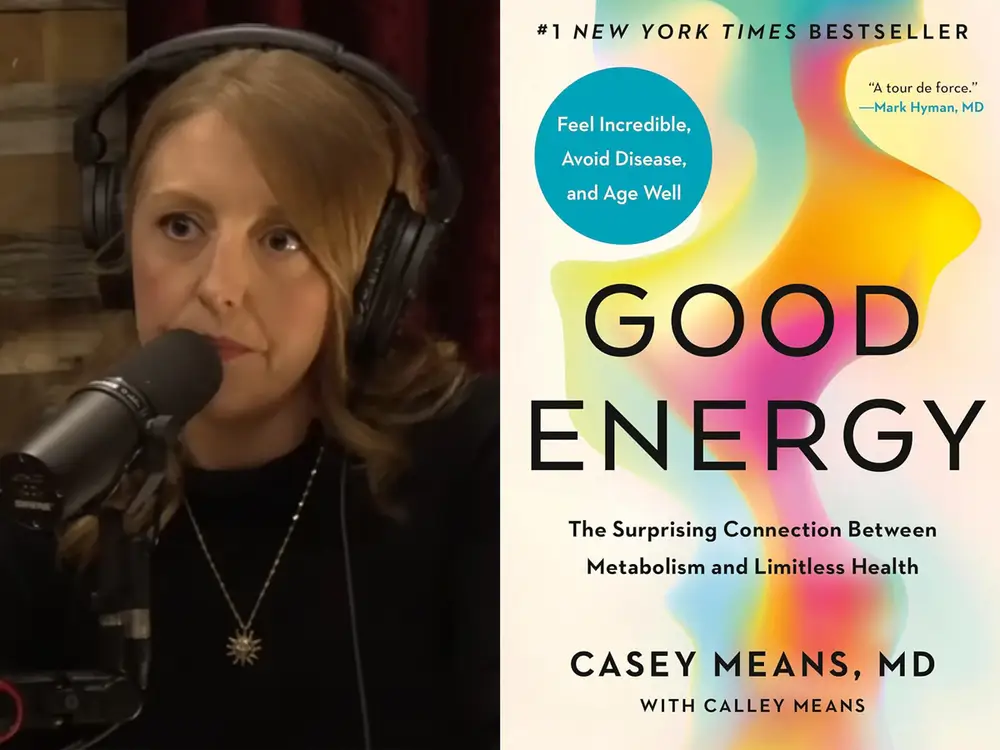Meet Casey Means, the surgeon turned health influencer behind RFK Jr.’s MAHA movement

Casey Means, a former surgeon, CEO of Levels, and author of the best-seller “Good Energy.”
A Stanford-trained surgeon who pivoted to build a booming health tech start-up could be a major player in the upcoming campaign to “Make America Healthy Again.”
Dr. Casey Means is CEO and cofounder of Levels, which aims to give people more direct control of their health via wearable tech that offers real-time updates on their blood sugar levels, and raised millions of dollars in funding from big-name investors like Marc Andreessen.
“I believe that every single person absolutely can understand the basics of metabolism and of their biomarkers and learn how to be the CEO of their own health,” she told B-17 in May in an interview about Levels. “One of the reasons why I left the conventional healthcare system is because I actually felt it was so infantilizing to patients and made it more complicated than it needed to be.”
Wellness is a family affair for Means. Her brother Calley is a former food and pharmaceutical consultant who interned for John McCain’s presidential campaign. He helped coordinate the first chats between now President-elect Donald Trump and Robert F. Kennedy Jr., his recent pick to lead the Department of Health and Human Services, the Wall Street Journal reported.
Together, the pair have built a major following on wellness-related topics.
They are co-authors of the best-selling book “Good Energy” and advisors to Kennedy, who has made “Make America Healthy Again” — or, MAHA — his mantra.

Robert F. Kennedy Jr. is a fan of Casey Means’ work and views in the wellness space.
The siblings have been featured on high-profile platforms like the Tucker Carlson Show and Joe Rogan’s podcast, calling for a shift from the current model of “sick care” by doctors playing the role of middlemen between individuals and their health and offering people actionable steps to take their health into their own hands with nutrition and exercise. Means said on Rogan’s podcast that the realization was an “awakening” in her career.
“There’s a really unfortunate landscape in our country where individuals are essentially at the mercy of the information that their doctor chooses to give them and how deeply it’s explained,” Means told B-17 in May.
The overarching philosophy is that metabolism is the foundation of good health, the key to addressing Americans’ overwhelming rates of chronic disease, and that individual healthy habits can help achieve it. Here’s what we know about Casey Means’ priorities.
Her mantra is that a healthy metabolism can reverse many health conditions
Means’ book promotes the pursuit of Good Energy, which she defined as great metabolic health. “It governs the very essence of what (quite literally) makes you tick,” she said in the book, “whether your cells have the energy to do their jobs of keeping you nourished, clear-minded, hormonally balanced, immune protected, heart-healthy, structurally sound — and so much more.”
According to Means, roughly 93% of US adults have “Bad Energy,” or poor metabolic health. She attributes conditions like depression, infertility, heart disease, type 2 diabetes, erectile dysfunction, cancer, and Alzheimer’s to habits like eating ultra-processed foods and sleep deprivation. Means argues that inflammation and oxidative stress, unstable molecules that cause cell damage, underpin these modern diseases.
In the scientific community, there’s consensus with Means about the importance of maintaining a healthy metabolism, which is often associated with weight loss and can also reduce the risk factors of heart disease, stroke, and type 2 diabetes. Studies also show some links between metabolic health and depression.
However, Means has also been criticized for exaggerating health risks, such as stating in her book that “each additional serving of ultra-processed food we eat” increases early mortality by 18%, referencing a 2019 study conducted in Spain.
“I’ve easily had 1000 bags of chips in my life,” Brad Stulberg, an adjunct professor of health management and policy at the University of Michigan posted on X. “If this is true, it means my mortality risk has increased by 18,000 percent.”
Too much emphasis on metabolism also risks oversimplifying health, according to Christy Harrison, a registered dietitian and nutrition writer behind the Substack “Rethinking Wellness.”
“I’m automatically suspicious of anyone who claims they’ve identified the ‘one true cause’ of all diseases. That’s typically just a way of selling you something,” she told B-17. “The human body and disease processes are far too complex to pin on one single ‘root cause,’ even though I know from experience that that idea can be so appealing.”
Means is critical of the US healthcare system, urging readers to ‘trust yourself, not your doctor’
In the book, Means criticizes the healthcare system, drawing from her experience in medical school and work as a surgeon. Calley Means similarly criticizes the pharmaceutical industry after working as a lobbyist.
“Every institution that impacts your health makes more money when you are sick and less when you are healthy — from hospitals to pharma to medical schools, and even insurance companies,” she said.

Casey Means has a business that helps people track their blood sugar levels through a wearable monitor — something people with diabetes have done for years, but is new for the general public.
Means, who runs a wearable glucose monitor business, promotes a more individualized approach to health in her book. She recommends wearing a fitness tracker, using continuous glucose monitors, and reading your own lab results rather than depending on a doctor to interpret them for you. The book has a section outlining how to analyze your bloodwork results to make sure you have Good Energy.
While she still says you should see doctors for acute, life-threatening problems and emergencies, she advises against trusting doctors for chronic issues like high cholesterol and PCOS.
She espouses popular advice around diet, exercise, and sleep
Throughout the book, Means promotes widely agreed-upon health advice. She recommends a diet rich in fiber and antioxidant-packed fruits and vegetables while cutting ultra-processed foods. She also encourages eating foods with nutrients like vitamin C, magnesium, and omega-3 fatty acids, hydrating throughout the day, and avoiding plastic packaging.





